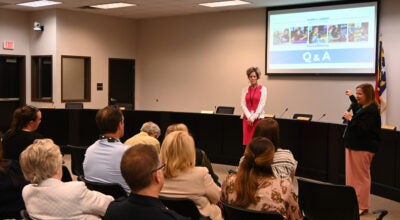Lawmakers say they’re aiming for ‘consistency’
Published 12:00 am Sunday, June 1, 2014
Gov. Pat McCrory quickly sided with state lawmakers in signing off on a bill Thursday modifying the state’s tax rules and repealing privilege taxes.
During their discussions in Raleigh, lawmakers looked at several cases across the state where municipalities were using the privilege tax egregiously, including Charlotte.
But municipalities could be out more than $62 million combined.
McCrory said lawmakers have pledged to work with the affected towns and cities to help them make up the lost revenue or find a substitute.
Although it seems unlikely the legislature will be able to tackle the issue in a short session that quickly is winding down, lawmakers said they will focus on it during the long session.
Municipalities do, however, have the ability to use the privilege taxes for another year, as the tax sunsets in July of next year.
Salisbury City Council Manager Doug Paris said he is “very hopeful something will be worked out based on the governor’s comments.”
“I spoke with Senator Brock this afternoon and he assured me next session there would be a replacement revenue fix,” Paris said Friday.
For N.C. Sen. Andrew Brock, R-Davie, the legislature’s decision was never about showing hostility toward municipalities, but rather demonstrating fairness across the state and instituting uniformity.
While some of the state’s municipalities have used the privilege tax fairly, Brock said other municipalities have abused it while even others don’t have one in place.
In some municipalities, businesses located farther away from the respective downtowns were paying more, Brock said.
“The tax was used almost as a carrot in some municipalities to attract businesses while at the same time being used as a stick to beat back certain businesses,” Brock said. “We need to be finding our money elsewhere.”
Brock said one of the main concerns during the debate was whether the privilege tax was evolving into a gross receipt tax — a tax on the total gross revenues of a company regardless of their source.
“Right now, the state is showing economic growth and is rebounding from the recession,” Brock said. “The last thing we need to do is have these taxes hindering our small businesses. We need to keep that stable footing.”
N.C. Sen. Gene McLaurin, D-Richmond, is a former mayor and had somewhat of a different perspective on getting rid of the privilege taxes.
While there needs to be consistency across the state, McLaurin said, the state legislature sometimes meddles too much in the business of municipalities.
“Local governments need to make decisions that impact local communities. We don’t need to be overreaching and dictating how municipalities generate those local revenues,” McLaurin said.
The business privilege taxes did happen to place an undue burden on small businesses in certain areas, McLaurin said.
With the extension of the privilege tax licenses being in effect for another year, McLaurin said he is confident a reasonable compromise will be reached.
“The majority party has overreached in a number of cases, and the privilege tax issue is one of those. Our local governments provide so many services and help with economic development,” McLaurin said. “We cannot be restrictive in Raleigh, be the know-all and try to micromanage the local governments. They need to have the flexibility to do what they need to do.”
N.C. Rep. Harry Warren, R-Rowan, said he agrees with the concept of the privilege tax as he as lived in different states.
“Most times, there are consistent prices for doing business within a town — not based on how much business the entity is doing in town,” Warren said.
During talks in Raleigh, Warren said lawmakers examined some cases where the privilege tax license was “used pretty egregiously,” including Charlotte.
Warren said Rowan County was one of 88 counties where businesses were paying a privilege tax for doing business in Charlotte.
Charlotte also used the tax with businesses in a slew of other states as well as in other countries.
Although the sunset of the privilege tax will take a heavier toll on larger municipalities like cities, Warren said it is important to demonstrate uniformity and fairness to businesses across the board.
“Some didn’t use the privilege tax at all, and this won’t have an impact on them,” Warren said. “However, reform was definitely needed.”
Lawmakers will address finding a remedy for municipalities when the privilege tax goes away, Warren said.
N.C. Rep. Carl Ford, R-Cabarrus, said legislators looked at Charlotte in particular.
“If you do business in Charlotte, they want you paying the privilege license tax. There were businesses located in 88 of the state’s counties, 48 states and four other countries that are paying Charlotte. That’s egregious,” Ford said. “The bill had strong bipartisan support.”
Most of the towns in Rowan County do not have the privilege tax for businesses, Ford said.
Across the state, the taxes were ranging anywhere from $59 to thousands of dollars, Ford said.
The legislature is not showing hostility toward municipalities, Ford said, and doing away with the privilege tax ultimately will trickle down to help consumers.
“We’re hostile against large taxes and being anti-business,” Ford said.
Paris said the elimination of privilege license taxes is another example of state lawmakers causing hardship for North Carolina municipalities.
“We have been alarmed by the actions of the N.C. General Assembly to place cities in difficult financial positions,” Paris said Friday when he unveiled his proposed budget to Salisbury City Council.
If the General Assembly does not assist cities with replacement revenue for privilege license taxes, Salisbury will have to raise property taxes or cut services to make up for the loss of $400,000, based on anticipated revenue in 2015-2016, he said.
That would amount to a 1.5 cent property tax rate increase in Salisbury.
The loss of privilege license taxes comes on the heels of the expiration of “transitional hold harmless” allocations the state has been making each year to about 100 cities in North Carolina, including Salisbury.
Salisbury will lose $659,000 in the coming fiscal year, which starts July 1. Paris is recommending a 2.9 cent property tax rate increase to make up for the loss of state funding, as well as pay for local projects including road widening and street lights.
Hold harmless allocations were enacted by the legislature in 2002 to help communities make up the loss of shared revenue from a tax on business inventory, which had been repealed.
City Manager Mike Legg said Kannapolis collects about $220,000 a year in business privilege fees through a tiered system based on gross receipts that are self-reported by businesses.
Anticipating likely changes this year, city staff included only $84,000 in expected business privilege license revenues in the proposed 2014-15 budget.
“We think that will be reasonably accurate for this coming year … but the total loss will have to be addressed in the following year,” Legg said. “Spreading the impact over two years helps.”





